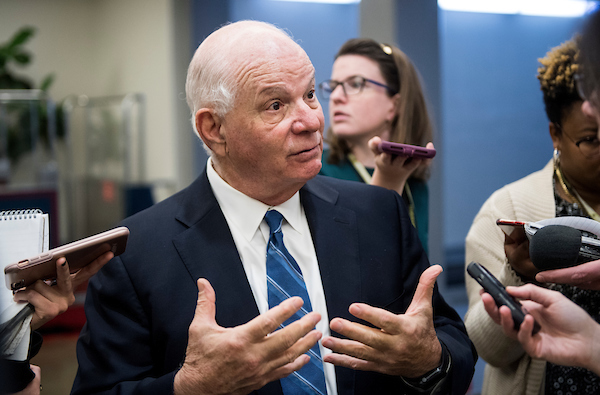New bipartisan Senate group facing uphill climb in bid to end shutdown

A bipartisan Senate group has launched new talks to end the lingering partial government shutdown that began Dec. 22 and is now the longest in history, but they are well aware of the uphill climb awaiting them.
Senators who met Monday haven’t coalesced around a single approach that can gain the approval of President Donald Trump as well as Democratic leaders in both chambers. But the group still appears to be discussing what kind of border security package can pass muster with the principal negotiators.
“I can’t say we have decided on a course of action because that would be gross optimism,” said Sen. Benjamin L. Cardin, D-Md. “But our objective is to get government open” and use a regular order process on border security. “There’s a lot of agreement among legislators on border security,” he said.
Sen. Thom Tillis, R-N.C., was part of a GOP group last week discussing a broader set of border and immigration policy proposals that ultimately went nowhere. But he was back at it with the bipartisan group Monday, and he again pointed to a February 2018 proposal that contained $25 billion for border security measures over a decade. That bipartisan amendment received 54 votes at the time, falling short of the 60 votes needed to advance.
It specified that the funds would go towards items such as drones, ships, aircraft and “tactical infrastructure,” in addition to physical barriers. It also would have allowed work permits for young adults brought to the country illegally as children, enabling them to remain in the U.S.
“I think, again, the big problem is, people are simplifying this and saying it’s just about the wall,” Tillis said. “But if you take a look even at the $25 billion and in the February proposals of last year, a significant amount of it had nothing to do with the physical structure.”
Trump last week again rejected such proposals, however. And on Monday he threw cold water on a top Republican’s proposal to reopen shuttered portions of the government for three weeks while talks continue over immigration and border security funding.
“I did reject it, yes. I’m not interested,” Trump said before departing for New Orleans, where he addressed the American Farm Bureau Federation later in the day. “I don’t want to just delay it. I want to get it solved.”
Senate Judiciary Chairman Lindsey Graham, R-S.C., who talks regularly with the president, told “Fox News Sunday” that he pitched the idea of a three-week stopgap bill to Trump in a conversation Sunday morning before appearing on the broadcast.
“I tried to see if we could open up the government for [a] limited period of time to negotiate a deal, and the president says, ‘Let’s make a deal, then open up the government,’” Graham said Sunday.
But Graham, who has long sought a comprehensive immigration and border security deal that would address the concerns of both parties, nonetheless publicly urged Trump to reconsider.
He said Sunday that he didn’t think House Speaker Nancy Pelosi, D-Calif., would ever make a deal, and therefore Trump should just exercise emergency powers to tap existing funds to finance portions of a wall along the southwest border.
Trump reiterated Monday that he doesn’t intend to declare an emergency, at least not yet.
Graham’s comments backing a short-term continuing resolution came as public opinion polls show that Americans generally blame Trump and the Republicans for the ongoing partial shutdown more than the Democrats on Capitol Hill.
House Democrats sought to press that advantage Monday by introducing two legislative options to temporarily reopen government: one CR that would run through Feb. 1, which the House will take up Tuesday, and another lasting through Feb. 28, to be debated Thursday.
In a statement, House Appropriations Chairwoman Nita M. Lowey, D-N.Y., said the measures present Senate Republicans with “additional options to end the shutdown while allowing time for negotiation on border security and immigration policy.”
Senate Majority Leader Mitch McConnell, R-Ky., hasn’t weighed in much to broker a deal on the shutdown standoff, deferring to Trump and Democratic leaders to work it out.
But McConnell has stood squarely with Trump on the president’s request for $5.7 billion to fund a steel wall on the border.
Democrats argue that the circumstances were different in their past votes for border fencing money: they were making concessions to advance more liberalized immigration laws, including a potential pathway to citizenship for undocumented immigrants.
Sen. John Cornyn, R-Texas, didn’t seem too confident the new bipartisan talks would succeed.
“Sort of the usual suspects are involved, and that’s a good thing if they can help us break the logjam. But again, until they come up with something the president will sign, it’s unfortunately a futile effort,” Cornyn told reporters Monday.
John T. Bennett and Jennifer Shutt contributed to this report.





